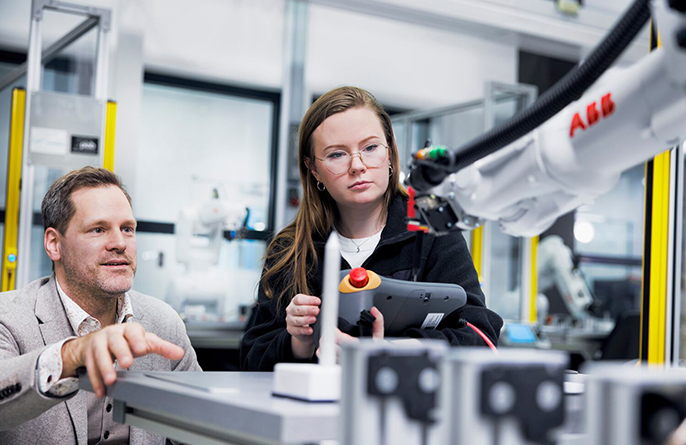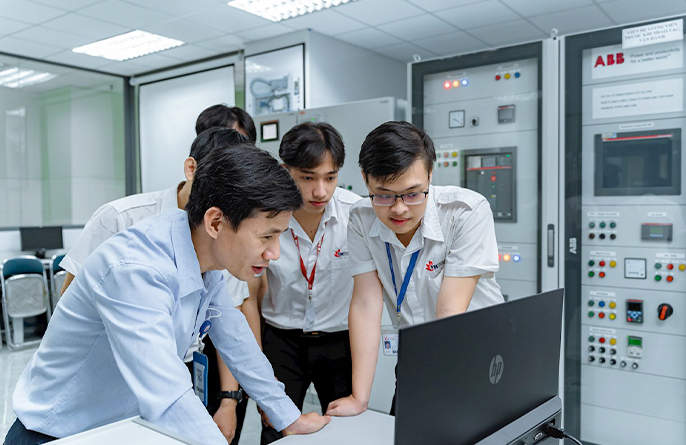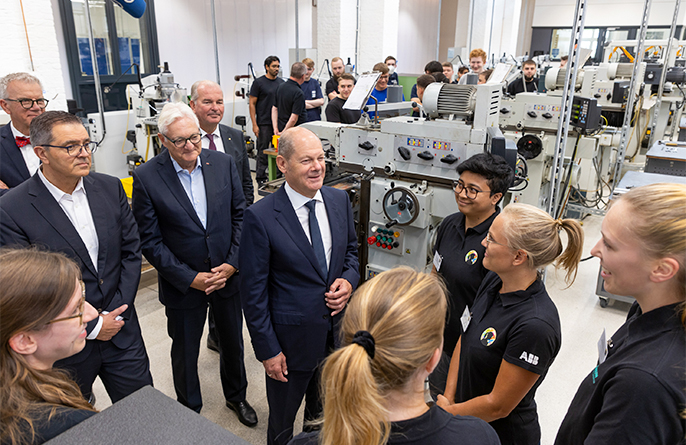Target 2030: Provide impactful support for community-building initiatives around the world
ABB has a longstanding tradition of active engagement in the communities in which its employees and customers live and work. As part of our 2030 sustainability strategy, we are reinforcing that engagement by providing impactful support for community-building initiatives.
ABB’s approach to community engagement combines strategic corporate partnerships with country-level projects to address local needs. We aim to assist the most vulnerable and to support community-building in education, diversity and inclusion, community healthcare, and poverty and disaster relief.
Our largest program is a corporate-level agreement with the International Committee of the Red Cross (ICRC), which provides humanitarian protection and assistance to victims of armed conflict and other forms of violence. During 2022, as a special initiative to support the humanitarian effort in Ukraine, we contributed more than CHF 2.2 million in employee and Group funds to the ICRC response. In addition, ABB employees in several countries took it upon themselves to travel to the borders of Ukraine to transport refugees from the country to safe locations, while others donated such essentials as food and warm clothing.
Education has long been a focus of ABB’s community engagement activities. Since 2007, ABB has funded the ABB Jürgen Dormann Foundation for Engineering Education, which helps financially disadvantaged engineering students in 12 countries. In 2022, the foundation supported 91 students at 13 universities.
In 2022, ABB expanded its global Robotics and Automation education program with several new training centers, including our €100 million global innovation and training campus in Austria. The new site, along with new regional training centers in the UK, Germany, Brazil, Sweden and Vietnam, raises the number of ABB’s Robotics and Automation training facilities to more than 40 around the world. More than 30,000 students from high schools, colleges and universities, as well as apprentices and staff, now participate in our training programs each year.
The sites complement the business area’s other instructional offerings, which include software suites and hardware, in the form of collaborative robot cells and application packages. Through more than 100 global partnerships with schools and universities, ABB works with educators to generate curriculum materials that will train young people and prepare them for the jobs of tomorrow.
The Robotics and Automation education program was developed to bridge a critical skills gap that has been identified by our research. In a 2022 survey of U.S. and European business leaders conducted by ABB, 74 percent of European and 70 percent of U.S. businesses said they planned to re- or nearshore operations to improve the resilience of their supply chains. The majority of these businesses view automation as a key to enabling these shifts and plan to invest in robotics and automation in the next three years.
Despite this growing appetite for automation, ABB’s 2022 global education survey found a significant shortfall in the education and training needed for the automated workplaces of the future. Only one in four educational institutions currently make any use of robots as part of their teaching programs.
For more information on our drive to prepare people for success in an age of robotics and automation, please visit the webpage ABB Robotics in Education.
Close case study
We also continued our local commitments to promote STEM education and careers, particularly for girls and women. ABB’s scholarship and mentoring programs continued in China, Estonia, Hungary, India, Italy, Sweden and the United States, among other countries. Many of these academic programs include modules that provide students with practical experience in real industrial environments and assist them in developing soft skills to enhance their employability upon graduation. In 2022, ABB marked 20 years of support for Junior Achievement, a non-profit organization that runs entrepreneurship and job preparation programs in Italy. In 2022, 50 ABB employees served as “dream coaches” in this program, providing their knowledge and expertise to over 870 students.
The Industrial University of Ho Chi Minh City (IUH) has launched the first university Smart Grid Lab in Vietnam with support from ABB. Located within the Electrical, Electronics, Control and Automation Faculties, this lab will give 350 students a year the opportunity to build the skills they need to address the power network challenges of the future.
The lab offers an advanced distribution grid setup equipped with a range of ABB solutions that allow students to visualize how a power grid operates in real time. As the fast-moving megatrends of urbanization and digitalization collide with the necessary shift toward renewable energy sources, it is essential that the next generation of engineers understand the complex technical interactions among power systems, control systems and power protection systems.
Partnerships with educational institutions are crucial to address energy challenges, and we support such initiatives that help prepare people to thrive in the future. The young engineers who have begun to hone their skills at the Smart Grid Lab in Vietnam will help ensure that power grids continue to evolve in a way that builds resilience and avoids shortages and outages as the energy transition accelerates.
Close case study
In 2022, we added a range of major new initiatives to the large number of educational, technical, entrepreneurial and hands-on training programs that ABB runs for young people. These initiatives included support for the establishment of the first university Smart Grid Lab in Vietnam, our sponsorship of the Science Olympiad in the United States for K-12 students, and the inauguration of our expanded training center in Berlin.
Across the world, we also made donations or provided services and other forms of support to vulnerable people and those affected by natural disasters, such as the hurricanes, tornadoes and floods that occurred in the United States and Pakistan. In the United States, ABB employees were able to donate to help their colleagues in need by making tax-deductible gifts to the ABB Employee Relief Fund. The ABB Foundation, funded by ABB in the United States, provides a large portion of the relief fund and covers program costs and fees. Cash grants are available to U.S.-based full- and part-time employees or temporary contract workers who experience a catastrophic disaster. The fund is administered by E4E Relief, a leading operator of relief funds for large companies.
ABB’s employees were active over the past year, providing assistance to those suffering from food insecurity. Through donations and volunteer activities, ABB employees supported food banks and other programs in Australia, Canada, Hungary, the United Arab Emirates and the United States.
Over the course of 2022, we were unable to initiate the research and consultations that had been planned to develop our community engagement strategy further. We will kick off this process in 2023, with a view to developing a harmonized approach to volunteer activities and community programs.
At ABB, we understand the critical importance of preparing apprentices to meet the industrial needs of tomorrow. To this end, in 2022, ABB in Germany inaugurated its expanded training center in Berlin. The “Learning Factory Industry 4.0” forms the centerpiece of a new multifunctional extension building. The site contains cutting-edge training facilities that prepare trainees for the digital future of manufacturing.
Creating training centers of this kind benefits not only ABB but also the many companies we partner with. By working together and supporting each other, we can stay competitive and make important joint contributions to strengthening the talent pool that represents the future of Germany’s workforce.
The facility resembles a highly automated industrial plant and is designed to impart a holistic understanding of digitally networked production processes. Under the guidance of their instructors, the trainees work to produce a model of an ABB Formula E racing car at the plant. With the new expansion, the ABB training center in Berlin more than doubled its capacity, welcoming an additional 205 apprentices working in 17 different apprenticeships.
These young people are now learning skills that will set them up for long-term success in an Industry 4.0 world. For example, apprentices at the facility learn to monitor networked systems and to rectify any faults that arise in the production processes themselves. This remarkable new resource is making it possible for apprentices to master critical new skills in a clear and practical way.
Close case study


